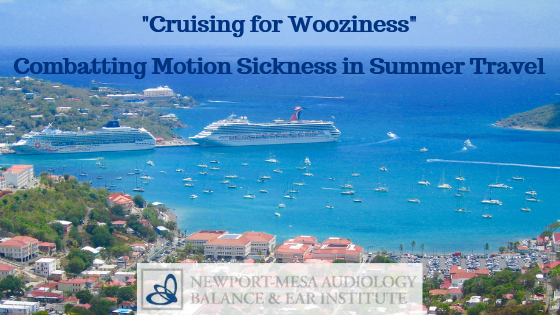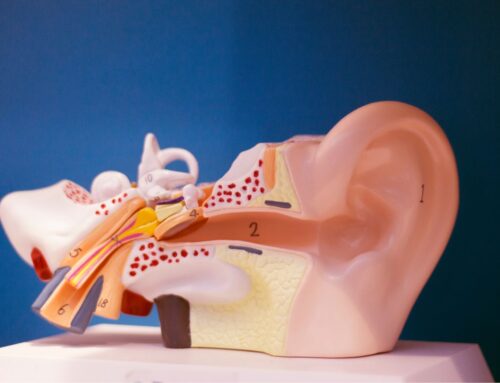Combatting Motion Sickness in Summer Travel
Dr. Jennifer Grace, Clinical Director

With summer here, many people take to the road, water and air for vacation. Cruises are especially popular during the summer months. If you’ve ever been on a cruise, you’ve likely seen a lot of people equipped with their motion sickness prevention apparatus. That is one of the challenges of travel – the risk for motion sickness. Motion sickness is a very common disturbance of the inner ear (vestibular system). It shows up as inconvenient nausea, vomiting, fatigue, headaches and irritability.
Although it is most common with women and children, motion sickness can strike anyone, resulting from even the simplest road trip on a curvy mountain road or a leisurely boat ride. Your brain gets conflicting information from your body, eyes and inner ear, which tells your brain how your head is moving. It can be very disorientating and frustrating for vacationers, as it can ruin their entire day and sometimes the entire trip.
While motion sickness is typically a short term ‘illness’ caused by self-imposed activities such as travel, it can also occur while watching TV, movies, playing video games or using virtual reality goggles. It’s a pretty common ailment, with an estimated 200,000 cases a year, yet, it’s relatively preventable and self-treatable.
Basic prevention includes focusing your eyes on the horizon, in the direction of travel, and not reading or looking at small screens (phones or tablets) while in motion. Eating simple, bland foods like crackers, bread, in addition to drinking clear liquids, settles an upset stomach. People shouldn’t overeat or drink alcohol to help ward off motion sickness. Getting fresh air while on a boat or in a car, or turning up the air from the vent while on an airplane, is also good for preventing motion sickness. Food or drink made with ginger tend to soothe an upset stomach as well. Definitely avoid smoking and other strong odors that exacerbate it.
Over the counter medicine like Dramamine, or patches that affix behind the ear, can help, but they can also have unwanted side effects like drowsiness. You certainly don’t want to sleep through a vacation! There are also bracelets that claim to help by targeting pressure points in the wrist area. You shouldn’t need to spend money on ‘miracle cures’; stick to the methods that are commonly known and effective.
Another related topic we’d like to cover is an ailment similar to motion sickness, but unlike your typical motion sickness that goes away after the mode of travel is over, mal de débarquement syndrome, also known as MdDS, doesn’t go away after the travel. It is a French term that means “sickness of disembarkment” (getting off the boat). It’s the sensation of movement felt after boat travel, that leaves a person feeling disoriented and off-balance.
People experience a rocking or swaying sensation, not a spinning vertigo. It can be accompanied by sensitivity to lights and noise and crowds, cognitive, brain fog, blurry vision, anxiety and fatigue to name a few. It can hit a person who travels by airplane, car and train as well as amusement park rides. It’s relatively typical, and tends to resolve on its own quickly, but for some unlucky people it can last for weeks or months, to even years after the triggering event.
Experts believe it’s an issue with the brain, rather than the ear. They’ve also speculated that hormone fluctuations among middle-aged women may be an attributing factor.
Conventional treatment methods for MdDS may be ineffective, such as medications prescribed for motion sickness. However, it helps to take care of your overall health and wellness, getting sufficient rest, as it tends to become exacerbated when people are stressed or tired. It can really put a damper on overall quality of life.
At our Institute, we diagnose and treat a wide spectrum of balance disorders. Though MdDS can sometimes prove difficult to diagnose, we test all 10 end organs of the inner ear in both the static and dynamic state so our doctors of audiology can pinpoint the cause of our patients’ balance disorder. When the origin of the dizziness and imbalance symptoms for our patients is found to be coming from the ear, our doctors can also provide a customized treatment plan for patients to help get them on the road to recovery.
We hope your summer plans include plenty of fun in the sun, in addition to travel, but if you’re prone to motion sickness, be sure to take precautions to prevent it. We want you to enjoy each day to its fullest. Regardless of the cause of your dizzy symptoms, we are here for you. If you have persistent dizziness, vertigo or imbalance, be sure to contact our Patient Services Team to schedule an evaluation.
References: https://vestibular.org/mal-de-debarquement
https://health.clevelandclinic.org/why-can-motion-sickness-persist-even-after-your-cruise/






Leave A Comment